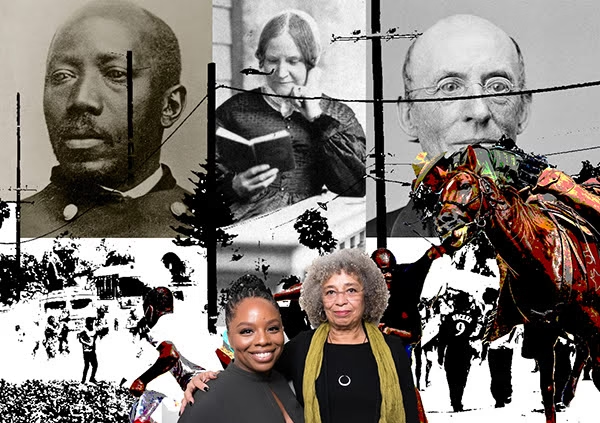In a moment when so much in the world we know seems turned upside down and inside out, the holiday season is the only time of year we get to experience a kind of reset. A reset that requires practicing time-honored traditions such as attending services at our respective houses of worship, or not, volunteering in service of families in need, singing collectively holiday-themed songs, gathering to break bread and in thanksgiving, and reconnecting with loved ones without bickering and acrimony.
In some lit corner of every village and hamlet, and every town and city across these United States, some families still sing the old songs and tell the old stories of our shared experience as Americans. Embedded in that tradition is Over the River, Through the Woods, a Thanksgiving poem by Lydia Maria (Mariah) Child that was eventually turned into a song.
The sentiment embodied by this poem feels very familiar 180 years after it was composed, except for the fact that modern transportation left behind the horse and buggy long ago, and that due to climate change, winter snow is less frequent in more parts of the country than not.
Nearly four years ago, at the UCLA Law Review Symposium: Toward An Abolitionist Future, Angela Davis framed abolition as a historical and evolving movement: 19th-century abolition targeted slavery, 20th-century abolition confronted racialized second-class citizenship, and later campaigns addressed the death penalty and the child and family service system. Davis emphasized links between these struggles and police and prison abolition.
Patrisse Cullors, acknowledging Davis as a mentor, called for an “abolitionist culture” rooted in care rather than punishment, urging society to challenge carceral norms in everyday life, explaining, “Abolition is how we show up for each other.” She noted that, “We’ve digested an economy of punishment and revenge. … I’m calling for an abolitionist culture and that we move toward a culture of care.”
Both highlighted that contemporary abolition, now entering mainstream conversation, must retain its radical, revolutionary edge, inspiring practical steps toward an abolitionist future. They echoed Maria Child, who used her pen to dismantle the institution of slavery, do violence against America’s conceit in its call for the dispossession of these indigenous peoples, as it claimed Manifest Destiny.
Born in 1802, Lydia Maria Child educated herself despite limited opportunities for women and developed a lifelong commitment to justice for marginalized peoples. She first advocated for Indigenous peoples, protesting the forced removal of the Cherokees and denouncing violence against Plains tribes. This work naturally expanded into anti-slavery activism, culminating in her 1833 Appeal in Favor of That Class of Americans Called Africans, a comprehensive critique of slavery and racial prejudice. Child also championed women’s empowerment through literature and biographies, emboldening women to public action.
It should also be noted that the period during which she was most active, the social-political milieu of the time was not too much different than what it is today with federally deputized hoodlums kidnapping free and enslaved and citizens and noncitizens alike following the passage of the Fugitive Slave Act of 1850 or the Trump regime’s arresting every working class immigrant in sight; and the weaponizing of religious bigotry and chauvinism to sow seeds of division every which way.
Child showed up for the marginalized, the disenfranchised, and the dispossessed the same way members of the 19th-century resistance movement we know today as the Underground Railroad showed up: by hiding, feeding, and clothing enslaved people while facilitating their escape to freedom, misdirecting slave catchers, and passing on intelligence to Union forces. The work of the likes of Indivisible, the Harbor Area Peace Patrol, and Black Lives Matter Grassroots is doing the work of the Underground Railroad resistance movement.
We see it in the organized rallies, marches, and vigils outside detention centers and federal buildings, with people of conscience opposing deportations, demanding the release of detained immigrants, fundraising as they partner with immigrant-rights organizations to provide bail funds, legal representation and resources for families affected by ICE raids; and organizing “know-your-rights” workshops and campaigns to challenge local collaboration with ICE.
The parallels are striking. We would do well to remember the lessons from Child’s life and the pre-Civil War period. As we gather this holiday season, we honor that legacy not only by reflection and tradition but by showing up for those most in need — continuing the work of abolition in our time.
To learn more about Lydia Child’s legacy, visit permproductions.com, where you can stream Constance L. Jackson’s (now Natoma Lillie Keita) documentary, Over the River: Life of Lydia Maria Child, Abolitionist for Freedom. Jackson directed and produced Over the River in 2007, earning recognition from Child scholars and LA County Supervisors. Jackson was instrumental in helping to induct Child into the National Women’s Hall of Fame in 2001, alongside Althea Gibson, Lucille Ball, Ruth Bader Ginsburg, and Rosalynn Carter. This renewed attention led to Child’s permanent exhibit at the Smithsonian’s National Museum of African American History and Culture.



